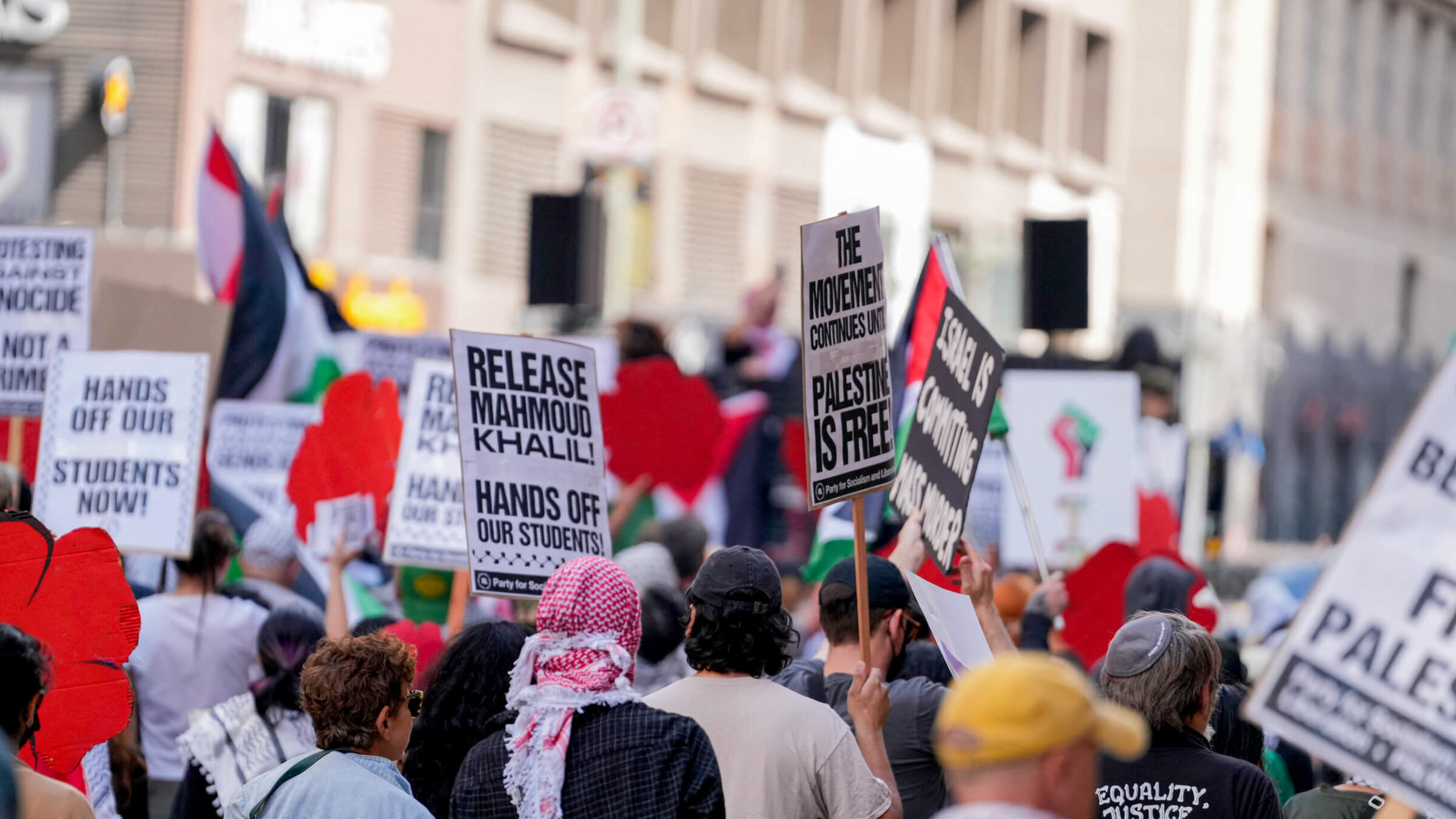Passover teaches us why Jews should stand with Mahmoud Khalil
The story of the Exodus is one of Jews deciding to reject our role in a tyrant’s narrative

Pro-Palestinian protesters demonstrate against the arrest of activist Mahmoud Khalil in Los Angeles March 29. Photo by Ali Matin/Middle East Images/Middle East Images via AFP
Mahmoud Khalil — the Palestinian activist and legal United States resident whom President Donald Trump’s administration is attempting to expel — can be deported.
That, at least, was the decision rendered by a judge in Louisiana on Friday. In a ruling sure to be appealed, Judge Jamee Comans decided that she had no authority to question Secretary of State Marco Rubio’s determination that Khalil’s continued presence in the U.S. could have “adverse foreign policy consequences.” In a memo submitted to the court earlier this week, Rubio wrote that Khalil’s “past, current, or expected beliefs, statements, or associations” may be “otherwise lawful” but are against U.S. foreign policy interests.
It’s of particular resonance that this decision came down on the eve of Passover. When we sit down to read the Haggadah during the first Seder on Saturday night, we will be discussing the story of Jews’ refusal to be used in a tyrant’s narrative. The story of Passover is the story of our community’s rejection of the role assigned to it by an authoritarian, and of their courage to imagine something different and better. I will read that story, and think about how my government is trying to deport Khalil for his beliefs in the name of the Jews.
I will read this story of liberation and think about how Khalil should be free — should have never been imprisoned in the first place. And I will think of how crucial it is that American Jews again find a way to reject our role in the story spun by a would-be tyrant, and stand up for something better.
Because, whether or not we buy Trump’s many assertions that his moves against U.S. campuses and student protesters are all in the name of preserving Jewish safety, this story is being told about us. Rubio wrote in a memo that letting Khalil remain would undercut “U.S. policy to combat antisemitism around the world and in the United States, in addition to efforts to protect Jewish students from harassment and violence in the United States.”
This was the logic that Comans wrote she had no authority to overturn — which doesn’t mean that Khalil will be deported immediately, as his lawyers will continue to argue his case in both Louisiana and New Jersey.
“I would like to quote what you said last time, that there’s nothing that’s more important to this court than due process rights and fundamental fairness,” Khalil said, addressing Comans after the ruling. “Clearly what we witnessed today, neither of these principles were present today or in this whole process.”
I struggle, personally, to imagine how we can tell the story of Passover without drawing parallels to the injustice in our own country — an injustice that suggests that a single student protester’s objections to Israel have the power to undercut U.S. foreign policy.
During the Seders, we note that one reason this night is different from all other nights is because we eat bitter herbs to remind us of the bitterness of slavery. Yet at this time, in our name, Rümeysa Öztürk — a Tufts student arrested, apparently, for exercising her right to free speech in the form of a student op-ed objecting to the war in Gaza — is suffering terrifying asthma attacks, with no good medical recourse, in ICE detention. At the Seders, we recline to celebrate our freedom. Yet across the country, students and recent graduates on visas just like Öztürk are being detained, and losing theirs.
Speaking only for myself, I do not know how to read a story of deliverance from an unjust system without thinking of how my own country is being allowed to continue attempting to expel someone for their “expected beliefs,” or of how this is being done in the name of Jewish safety. As if arresting and expelling Jews’ peers for their thoughts — while cracking down on education, an actual tool against antisemitism — will somehow make Jews safer.
There are many interpretations of the story of Passover, some of which lean into the holiday’s contemporary relevance, and some that lean away. You can buy a feminist Haggadah, a rock and roll Haggadah, a radical Haggadah, a dad jokes Haggadah — the list goes on.
Texts and traditions get interpreted; that’s what gives them modern meaning. And these interpretations inevitably differ. There are those arguing for a Passover without Zionism and those arguing that wanting a Passover without Zionism is akin to wanting to remain in Egypt. So if and when Khalil and Friday’s decision comes up at Seders across America, I have no doubt that discussions will vary widely and wildly.
But at my Seder, I will ask that we take time to think deeply about what it means that, in a since-deleted post just before the holiday, Immigration and Customs Enforcement boasted that it has a mandate to stop illegal ideas from crossing American borders. Yes: ideas.
Passover itself is the story of an idea: The idea of liberation. In it, the liberation of Egypt’s Jews is tied to the fate of all of Egypt’s people. The suffering of one group is bound up in the suffering of others. We learn in this story that we have an obligation to pursue freedom and dignity.
The same is true in the U.S. of 2025. The rights, freedoms and dignities of all people in this country are bound up with one another. So this year, as I celebrate Passover and retell the story of Miriam and Moses, I will also tell the story of Mahmoud Khalil. I hope to eventually celebrate his liberation, too.

















